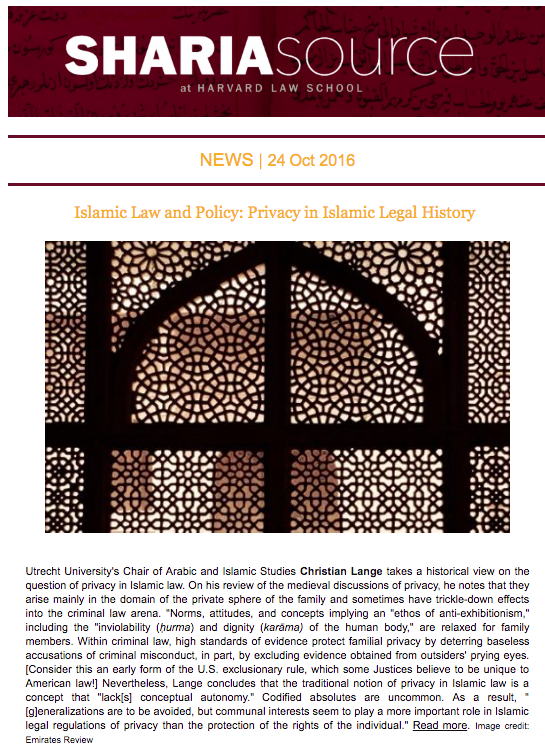
 Islamic Law and Policy: Privacy in Islamic Legal History Utrecht University’s Chair of Arabic and Islamic Studies Christian Lange takes a historical view on the question of privacy in Islamic law. On his review of the medieval discussions of privacy, he notes that they arise mainly in the domain of the private sphere of the family and sometimes have trickle-down effects into the criminal law arena. “Norms, attitudes, and concepts implying an “ethos of anti-exhibitionism,” including the “inviolability (ḥurma) and dignity (karāma) of the human body,” are relaxed for family members. Within criminal law, high standards of evidence protect familial privacy by deterring baseless accusations of criminal misconduct, in part, by excluding evidence obtained from outsiders’ prying eyes. [Consider this an early form of the U.S. exclusionary rule, which some Justices believe to be unique to American law!] Nevertheless, Lange concludes that the traditional notion of privacy in Islamic law is a concept that “lack[s] conceptual autonomy.” Codified absolutes are uncommon. As a result, “[g]eneralizations are to be avoided, but communal interests seem to play a more important role in Islamic legal regulations of privacy than the protection of the rights of the individual.” Read more. Image Credit: SHARIAsource
Islamic Law and Policy: Privacy in Islamic Legal History Utrecht University’s Chair of Arabic and Islamic Studies Christian Lange takes a historical view on the question of privacy in Islamic law. On his review of the medieval discussions of privacy, he notes that they arise mainly in the domain of the private sphere of the family and sometimes have trickle-down effects into the criminal law arena. “Norms, attitudes, and concepts implying an “ethos of anti-exhibitionism,” including the “inviolability (ḥurma) and dignity (karāma) of the human body,” are relaxed for family members. Within criminal law, high standards of evidence protect familial privacy by deterring baseless accusations of criminal misconduct, in part, by excluding evidence obtained from outsiders’ prying eyes. [Consider this an early form of the U.S. exclusionary rule, which some Justices believe to be unique to American law!] Nevertheless, Lange concludes that the traditional notion of privacy in Islamic law is a concept that “lack[s] conceptual autonomy.” Codified absolutes are uncommon. As a result, “[g]eneralizations are to be avoided, but communal interests seem to play a more important role in Islamic legal regulations of privacy than the protection of the rights of the individual.” Read more. Image Credit: SHARIAsource
 Islamic Law and Policy: Privacy in Islamic Law in the Modern State Guest contributors Vidusha Mardi and Bhaira Acharya examine issues of privacy and the state in Islamic law with the baseline argument that privacy is the default rule in Islamic law and that the public sphere, into which the state may intrude, is the exception to this rule. As they put it, Islamic law recognizes that “every society [must] impose certain requirements on individuals by the law and by societal norms,” but anything not explicitly located within the worldly public sphere is assumed to reside within the domain of the private sphere. While the individual’s relationship with the divine demands that she always “ordain good and forbid evil,” state intrusion could be considered a trespass on a relationship meant to remain between the individual and the divine. Such invasion is, in the opinion of many modern jurists, “‘exactly what Islam has called as the root cause of mischief in politics.'” Their views come from a longer report on privacy in Islamic law written for the Centre for Internet & Society in Bengaluru, India: Identifying Aspects of Privacy in Islamic Law. Read more. Image Credit: Rueters
Islamic Law and Policy: Privacy in Islamic Law in the Modern State Guest contributors Vidusha Mardi and Bhaira Acharya examine issues of privacy and the state in Islamic law with the baseline argument that privacy is the default rule in Islamic law and that the public sphere, into which the state may intrude, is the exception to this rule. As they put it, Islamic law recognizes that “every society [must] impose certain requirements on individuals by the law and by societal norms,” but anything not explicitly located within the worldly public sphere is assumed to reside within the domain of the private sphere. While the individual’s relationship with the divine demands that she always “ordain good and forbid evil,” state intrusion could be considered a trespass on a relationship meant to remain between the individual and the divine. Such invasion is, in the opinion of many modern jurists, “‘exactly what Islam has called as the root cause of mischief in politics.'” Their views come from a longer report on privacy in Islamic law written for the Centre for Internet & Society in Bengaluru, India: Identifying Aspects of Privacy in Islamic Law. Read more. Image Credit: Rueters
 IN SUMMARY:: MLTalks Series at MIT: Intisar Rabb and Manal Omar in conversation with Ethan Zuckerman Ethan Zuckerman framed the conversation with HLS Professor and SHARIAsource Editor-in-Chief Intisar Rabband USIP VP for the Middle East Manal Omar as a discussion within a larger approach of the Media Lab’s aim to engage in solution-making dialogue from a techno-social perspective. Last week’s discussion tackled pressing questions of Islamic law as it intersects with American society and politics, civil rights, and US-based foreign policy for Muslim-majority countries. Omar provided insights on how humanitarian aid and development activities benefit from implementing strategies that incorporate religious literacy and the moral authority of religious leaders who appeal to sharīʿa as a working knowledge set. Rabb discussed the link between sharīʿa and civil rights in the American context, as the legacy of Muhammad Ali most powerfully demonstrates. Waves of African-Americans became Muslim out of impetus to fight for civil rights, seeing Islam as an equalizing force and sharīʿa as a call to fight for justice. For her, that legacy represented just one instance of a larger trend within a decidedly American experience of sharīʿa, one that she referred to in shorthand as “civil rights sharīʿa.” When asked about the role of sharīʿa in educational and policy contexts, Rabb provided a framework for approaching discussions of Islamic law both online and offline — in ways that track the major inspiration and mission of SHARIAsource in its design to provide content and context on Islamic law. Namely, she stressed the need to consider a large number of source materials, cultural contexts, and political realities when approaching any analysis of the meaning and application of Islamic law. Image credit: Paul Beran
IN SUMMARY:: MLTalks Series at MIT: Intisar Rabb and Manal Omar in conversation with Ethan Zuckerman Ethan Zuckerman framed the conversation with HLS Professor and SHARIAsource Editor-in-Chief Intisar Rabband USIP VP for the Middle East Manal Omar as a discussion within a larger approach of the Media Lab’s aim to engage in solution-making dialogue from a techno-social perspective. Last week’s discussion tackled pressing questions of Islamic law as it intersects with American society and politics, civil rights, and US-based foreign policy for Muslim-majority countries. Omar provided insights on how humanitarian aid and development activities benefit from implementing strategies that incorporate religious literacy and the moral authority of religious leaders who appeal to sharīʿa as a working knowledge set. Rabb discussed the link between sharīʿa and civil rights in the American context, as the legacy of Muhammad Ali most powerfully demonstrates. Waves of African-Americans became Muslim out of impetus to fight for civil rights, seeing Islam as an equalizing force and sharīʿa as a call to fight for justice. For her, that legacy represented just one instance of a larger trend within a decidedly American experience of sharīʿa, one that she referred to in shorthand as “civil rights sharīʿa.” When asked about the role of sharīʿa in educational and policy contexts, Rabb provided a framework for approaching discussions of Islamic law both online and offline — in ways that track the major inspiration and mission of SHARIAsource in its design to provide content and context on Islamic law. Namely, she stressed the need to consider a large number of source materials, cultural contexts, and political realities when approaching any analysis of the meaning and application of Islamic law. Image credit: Paul Beran
See the full newsletter.

